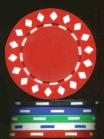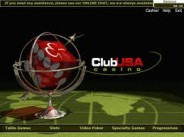Club USA Casino
Club USA Casino has burst onto the online casino scene and has won a lot of support from online gamblers. Accepting players from around the world, including the US market, Club USA Casino has a wide variety of slots and games on offer. The casino also has a good sign-up bonus and great customer support. For fun casino action, check out Golden Casino. Club USA Casino accepts US players.
The Super Bowl and Short Stack Strategy
While watching the recent Super Bowl, I could not help but make some poker analogies. At end of the game, I thought Al Michaels did an excellent job of explaining that the Seahawks needed two scores. David Apostolico is the author of 'Machiavellian Poker Strategy', and 'Tournament Poker and The Art of War,' and his latest title 'Poker Strategies for a Winning Edge in Business.' David's website is www.holdemradio.com/blog/
David Apostolico is the author of 'Machiavellian Poker Strategy', and 'Tournament Poker and The Art of War,' and his latest title 'Poker Strategies for a Winning Edge in Business.' David's website is www.holdemradio.com/blog/ 
Thus, they had to make the first score while there was still enough time to try an onsides kick and get the ball back. Once in field goal range, the Seahawks failed to do this and, of course, the clock ran out. The Seahawks instead of keeping their heads and focus basically became desperate and lost it rather than giving themselves a chance to win. Granted, they would have needed some luck and they had an uphill climb but they never gave themselves that chance.
 David Apostolico is the author of 'Machiavellian Poker Strategy', and 'Tournament Poker and The Art of War,' and his latest title 'Poker Strategies for a Winning Edge in Business.' David's website is www.holdemradio.com/blog/
David Apostolico is the author of 'Machiavellian Poker Strategy', and 'Tournament Poker and The Art of War,' and his latest title 'Poker Strategies for a Winning Edge in Business.' David's website is www.holdemradio.com/blog/ 
Thus, they had to make the first score while there was still enough time to try an onsides kick and get the ball back. Once in field goal range, the Seahawks failed to do this and, of course, the clock ran out. The Seahawks instead of keeping their heads and focus basically became desperate and lost it rather than giving themselves a chance to win. Granted, they would have needed some luck and they had an uphill climb but they never gave themselves that chance.
How does this compare to poker? Well, in that last drive the Seahawks were short stacked in the later stages of a no limit hold ‘em tournament. To get back in it, they would need some luck and they certainly faced an uphill climb. Yet, time and time again, I can’t tell you how many times I see poker players in that situation just give up and throw their few remaining chips away. Let me offer two examples of why that is a bad idea. In the last two home game tournaments I have played, I ended up winning after I was extremely short stacked. In both tournaments, I was ready to commit my entire stack to a pot where I had draws but rather than commit, I checked and called. In both cases, I was head’s up with the overwhelming chip leader and in both cases, they each failed to put me all-in and allowed me to survive.
In the first one, I called with Js-9s from the big blind. The flop came Qc-10s-2s giving me both a flush draw and a open-ended straight draw. Even though I did not have a made hand, I was actually a favorite against the great majority of hands. As such, I thought about pushing in but then thought better of it. My opponent was going to call no matter what. Yet, he may not put me all-in. If I did hit my hand, I knew I would get called for my remaining chips. So I checked. Sure enough, my opponent made a small value bet and I called. The turn brought another 10 and I checked and my opponent checked as well. The river brought a blank and I checked. My opponent then bet enough to put me all-in. I folded and lived to fight another day. My opponent turned over a A-10 giving him three tens. He was trying to trap me. The problem with his thinking was that if I made my hand, I would have beat him (unless the As came up). And if I did not make my hand, I was going to fold.
I think a lot of players would have moved all-in on the flop with my hand figuring this was their do or die hand. And, in fact, I was prepared to go all-in on the flop if I had to. However, I absolutely knew I would get called if I did that and even though the chance was small that my opponent may fail to put me all-in, I decided to give him the chance to make a mistake. I also knew that if I made my hand, it was extremely likely that I would get called.
In the next tournament, I was again short stacked when we were down to 6 players. The player to my immediate left had the overwhelming chip lead. He raised to twice the big blind. Everyone folded to me in the big blind. I called with 4s-8s. Not a great hand, but with blinds and antes I was getting the right price to call. The flop came 7s-5h-2s giving me a flush draw and a gutshot straight draw. I was prepared to move all-in since there was a very good chance that this flop completely missed my opponent. Again, I did not have nearly enough chips to force my opponent out. It was an automatic call for him. So I checked. As you might guess, my opponent made incremental bets on the flop and turn which I called. When I missed on the river, my opponent finally bet enough to put me all-in and I folded. I don’t know what hand my opponent had but he certainly had me beat.
I was now down to about $575 in chips when the average stack was over $5000. A few hands later with the blinds at $200-$400 (with $50 antes), I went all-in for my remaining $475 with Ad-Jd. I got two callers and when I made a flush, I just about quadrupled up counting the blinds and antes. Even though I was still short stacked, I now had enough chips to force others to fold. I made a nice comeback and won the tournament.
The lesson here is to give yourself the best chance to win. If you do not have fold equity (that is, your chip stack is not enough to force an opponent to fold), then don’t take that last stand until your opponent forces you to. You may not think a few chips will make much of a different but in the later stages of a tournament with blinds and antes high, you can easily triple or quadruple up with one hand. Sure you are going to need some luck, but save that shot at getting lucky rather than giving the rest of your chips away.
If the Seahawks had kicked a field goal with forty seconds left, they would have given themselves a chance to get lucky. If the get the onsides kick, they can take a couple of shots at the end zone. Basically, they would have had to double up twice in a row but as anyone who plays poker knows, that can happen. If you are going to play to win, you have to give yourself a chance to win.
[ learn to play poker! ]
